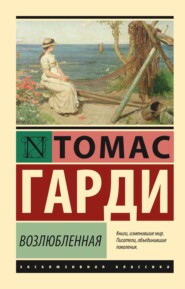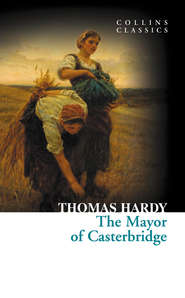По всем вопросам обращайтесь на: info@litportal.ru
(©) 2003-2025.
✖
Far From the Madding Crowd
Настройки чтения
Размер шрифта
Высота строк
Поля
The argument was unanswerable after a glance at Maryann. ‘Liddy – you must,’ said Bathsheba.
Liddy held up her hands and arms, coated with dust from the rubbish they were sorting, and looked imploringly at her mistress.
‘There – Mrs Coggan is going!’ said Bathsheba, exhaling her relief in the form of a long breath which had lain in her bosom a minute or more.
The door opened, and a deep voice said –
‘Is Miss Everdene at home?’ ‘I’ll see, sir,’ said Mrs Coggan, and in a minute appeared in the room.
‘Dear, what a thirtover place this world is!’ continued Mrs Coggan (a wholesome-looking lady who had a voice for each class of remark according to the emotion involved; who could toss a pancake or twirl a mop with the accuracy of pure mathematics, and who at this moment showed hands shaggy with fragments of dough and arms encrusted with flour). ‘I am never up to my elbows, Miss, in making a pudding but one of two things do happen – either my nose must needs begin tickling, and I can’t live without scratching it, or somebody knocks at the door. Here’s Mr Boldwood wanting to see you, Miss Everdene.’
A woman’s dress being a part of her countenance, and any disorder in the one being of the same nature with a malformation or wound in the other, Bathsheba said at once –
‘I can’t see him in this state. Whatever shall I do?’ Not-at-homes were hardly naturalized in Weatherbury farmhouses, so Liddy suggested – ‘Say you’re a fright with dust, and can’t come down.’
‘Yes – that sounds very well,’ said Mrs Coggan critically. ‘Say I can’t see him – that will do.’
Mrs Coggan went downstairs, and returned the answer as requested, adding, however, on her own responsibility, ‘Miss is dusting bottles, sir, and is quite a object – that’s why ’tis.’
‘Oh, very well,’ said the deep voice indifferently. ‘All I wanted to ask was, if anything had been heard of Fanny Robin?’
‘Nothing, sir – but we may know to-night. William Smallbury is gone to Casterbridge, where her young man lives, as is supposed, and the other men be inquiring about everywhere.’
The horse’s tramp then recommenced and retreated, and the door closed.
‘Who is Mr Boldwood?’ said Bathsheba.
‘A gentleman-farmer at Little Weatherbury.
‘Married?’
‘No, miss.’
‘How old is he?’
‘Forty, I should say – very handsome – rather stern-looking – and rich.’
‘What a bother this dusting is! I am always in some unfortun ate plight or other,’ Bathsheba said complainingly. ‘Why should he inquire about Fanny?’
‘Oh, because, as she had no friends in her childhood, he took her and put her to school, and got her her place here under your uncle. He’s a very kind man that way, but Lord – there!’
‘What?’
‘Never was such a hopeless man for a woman! He’s been courted by sixes and sevens – all the girls, gentle and simple, for miles round, have tried him. Jane Perkins worked at him for two months like a slave, and the two Miss Taylors spent a year upon him, and he cost Farmer Ive’s daughter nights of tears and twenty pounds’ worth of new clothes; but Lord – the money might as well have been thrown out of the window.’
A little boy came up at this moment and looked in upon them. This child was one of the Coggans, who, with the Smallburys, were as common among the families of this district as the Avons and Derwents among our rivers. He always had a loosened tooth or a cut finger to show to particular friends, which he did with an air of being thereby elevated above the common herd of afflictionless humanity – to which exhibition people were expected to say ‘Poor child!’ with a dash of congratulation as well as pity.
‘I’ve got a pen-nee!’ said Master Coggan in a scanning measure.
‘Well – who gave it you, Teddy?’ said Liddy.
‘Mis-terr Bold-wood! He gave it to me for opening the gate.’
‘What did he say?’
‘He said, “Where are you going, my little man?” and I said, “To Miss Everdene’s, please”; and he said, “She is a staid woman, isn’t she, my little man?” and I said, “Yes.”’
‘You naughty child! What did you say that for?’
‘’Cause he gave me the penny!’
‘What a pucker everything is in!’ said Bathsheba discontent-edly, when the child had gone. ‘Get away, Maryann, or go on with your scrubbing, or do something! You ought to be married by this time, and not here troubling me!’
‘Ay, mistress – so I did. But what between the poor men I won’t have, and the rich men who won’t have me, I stand as a pelican in the wilderness!’
‘Did anybody ever want to marry you, miss?’ Liddy ventured to ask when they were again alone. ‘Lots of ’em, I daresay?’
Bathsheba paused, as if about to refuse a reply, but the temptation to say yes, since it really was in her power, was irresistible by aspiring virginity, in spite of her spleen at having been published as old.
‘A man wanted to once,’ she said, in a highly experienced tone, and the image of Gabriel Oak, as the farmer, rose before her.
‘How nice it must seem!’ said Liddy, with the fixed features of mental realization. ‘And you wouldn’t have him?’
‘He wasn’t quite good enough for me.’
‘How sweet to be able to disdain, when most of us are glad to say, “Thank you!” I seem I hear it. “No, sir – I’m your better,” or “Kiss my foot, sir; my face is for mouths of consequence.” And did you love him, miss?’
‘Oh, no. But I rather liked him.’
‘Do you now?’
‘Of course not – what footsteps are those I hear?’
Liddy looked from a back window into the courtyard behind, which was now getting low-toned and dim with the earliest films of night. A crooked file of men was approaching the back door. The whole string of trailing individuals advanced in the completest balance of intention, like the remarkable creatures known as Chain Salpae, which, distinctly organized in other respects, have one will common to a whole family. Some were, as usual, in snow-white smock-frocks of Russia duck, and some in whitey-brown ones of drabbet – marked on the wrists, breasts, backs, and sleeves with honeycomb-work. Two or three women in pattens brought up the rear.
‘The Philistines be upon us,’ said Liddy, making her nose white against the glass.
‘Oh, very well. Maryann, go down and keep them in the kitchen till I am dressed, and then show them in to me in the hall.’
Chapter 10
Mistress and men
Half-an-hour later Bathsheba, in finished dress, and followed by Liddy, entered the upper end of the old hall to find that her men had all deposited themselves on a long form and a settle at the lower extremity. She sat down at a table and opened the time-book, pen in her hand, with a canvas money-bag beside her. From this she poured a small heap of coin. Liddy chose a position at her elbow and began to sew, sometimes pausing and looking round, or, with the air of a privileged person, taking up one of the half-sovereigns lying before her, and surveying it merely as a work of art, while strictly preventing her countenance from expressing any wish to possess it as money.
‘Now, before I begin, men,’ said Bathsheba, ‘I have two matters to speak of. The first is that the bailiff is dismissed for thieving, and that I have formed a resolution to have no bailiff at all, but to manage everything with my own head and hands.’
The men breathed an audible breath of amazement.

















